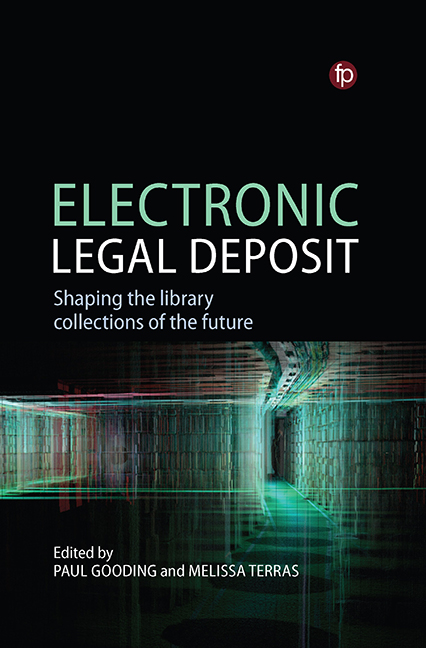Book contents
- Frontmatter
- Dedication
- Contents
- Figures and Tables
- Contributors
- Foreword
- Introduction
- PART 1 INSTITUTIONS AND IMPLEMENTATION
- 1 UK Non-Print Legal Deposit: From Regulations to Review
- 2 The Influence of Legal Deposit Legislation on the Digital Collections of the National Library Of Scotland
- 3 E-legal Deposit at the Biblioteca Nacional de México (National Library of Mexico)
- 4 Bibliographic Control in Zimbabwe: the Conundrum of Legal Deposit in the age of Digital Technologies
- 5 Electronic Legal Deposit in Sweden: the Evolution of Digital Publications and Legislative Systems
- PART 2 USERS AND CONTEXTS
- 6 Publishers, Legal Deposit and the Changing Publishing Environment
- 7 Making History: Digital Preservation and Electronic Legal Deposit in the Second Quarter of the 21st Century
- 8 Giving with one Click, Taking with the Other: Electronic Legal Deposit, Web Archives and Researcher Access
- 9 Follow the Users: Assessing UK non-print Legal Deposit within the Academic Discovery Environment
- 10 ‘An Ark to Save Learning from Deluge’? Reconceptualising Legal Deposit After the Digital Turn
- Index
6 - Publishers, Legal Deposit and the Changing Publishing Environment
Published online by Cambridge University Press: 07 November 2020
- Frontmatter
- Dedication
- Contents
- Figures and Tables
- Contributors
- Foreword
- Introduction
- PART 1 INSTITUTIONS AND IMPLEMENTATION
- 1 UK Non-Print Legal Deposit: From Regulations to Review
- 2 The Influence of Legal Deposit Legislation on the Digital Collections of the National Library Of Scotland
- 3 E-legal Deposit at the Biblioteca Nacional de México (National Library of Mexico)
- 4 Bibliographic Control in Zimbabwe: the Conundrum of Legal Deposit in the age of Digital Technologies
- 5 Electronic Legal Deposit in Sweden: the Evolution of Digital Publications and Legislative Systems
- PART 2 USERS AND CONTEXTS
- 6 Publishers, Legal Deposit and the Changing Publishing Environment
- 7 Making History: Digital Preservation and Electronic Legal Deposit in the Second Quarter of the 21st Century
- 8 Giving with one Click, Taking with the Other: Electronic Legal Deposit, Web Archives and Researcher Access
- 9 Follow the Users: Assessing UK non-print Legal Deposit within the Academic Discovery Environment
- 10 ‘An Ark to Save Learning from Deluge’? Reconceptualising Legal Deposit After the Digital Turn
- Index
Summary
Introduction
UK publishers have always had mixed attitudes to legal deposit. This chapter focuses on electronic legal deposit in the UK from the perspective of publishers, providing some assessment of what the impact on publishers has been in the relatively short time electronic legal deposit has been in existence, and the role of legal deposit in a dynamic digital environment.
The long opposition to legal deposit requirements from the publishing industry is well documented. Feather's historical account (Feather, 1994, 97– 121) brings into sharp focus the often vehement opposition of the publishing trade to the principle of legal deposit, and the trade's history of reluctant or non-compliance with the law. At the beginning of the 19th century, the amount of material being deposited was unsatisfactory for the deposit libraries. Anthony Panizzi, the principal librarian of the British Museum, through his energetic enforcement of legislation, established what may be regarded as ‘proper’ legal deposit in the UK (Altick 1957, 215; Harris, 1991) with more comprehensive compliance with the law.
The mid-20th century saw the advent of electronic publishing. This was initially limited to textual and numeric data, but increasingly it has incorporated recorded sound and still and moving images. The development of the world wide web and browser software in the 1990s and other developments has profoundly affected publishing practices (Brown and Boulderstone 2008; Deegan and Sutherland, 2009; Martin and Tian, 2010; Ramrattan and Szenberg, 2016). It became clear that restricting legal deposit to print publications would result in an increasingly large gap in the national legal deposit archive. The British Library (BL) commissioned several studies on potential issues arising from the extension of legal deposit to non-print publications (Electronic Publishing Services Ltd, 1996; Hendley ,1996; Martin, 1996). The BL, supported by the other legal deposit libraries and the British Film Institute, then submitted a proposal to the UK government to extend legal deposit to non-print publications (British Library, 1996).
Publishing is an important contributor to the UK economy. The Publishers Association (2019) reported that book and academic journal publishing income was £6 billion in 2018 and that there was ‘a 3% increase in digital sales income (to £2.6bn) and a 5% drop in physical sales (to £3.4bn)’.
- Type
- Chapter
- Information
- Electronic Legal DepositShaping the Library Collections of the Future, pp. 121 - 138Publisher: FacetPrint publication year: 2019
- 2
- Cited by

